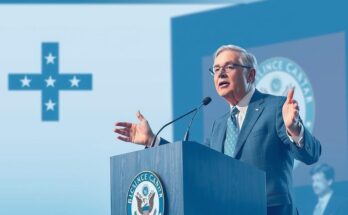Elon Musk is exiting the federal government, ending his brief role with the Department of Government Efficiency after facing legal issues, cabinet clashes, and inflated savings claims. His departure raises questions about the future of DOGE’s ambitious agenda as he shifts focus back to his businesses amid financial struggles. Additionally, Musk plans to lessen his political spending going forward.
In a surprising twist, Elon Musk is departing from the federal government, leaving behind his role with the Department of Government Efficiency (DOGE). After a brief and tumultuous 130 days in the initiative, Musk’s exit comes following a string of legal challenges and conflicts within the Cabinet. Despite efforts to present himself as a catalyst for efficiency, actual evidence of his successes remains elusive.
As Musk prepares for a final press conference with President Trump, the atmosphere is tense. During his tenure, Musk faced growing disapproval among the public and turmoil within his sprawling business empire. The friction with both Trump and other Cabinet members has been palpable. But it seems that DOGE’s plans to overhaul government bureaucracy will roll on, potentially unaffected by his departure.
Musk presented his involvement in DOGE as just a phase in his career, emphasising it was merely the conclusion of a “scheduled time” as a special government employee. Yet questions linger about what this means for DOGE’s ambitious agenda, particularly as critics highlight Musk’s lack of real legal authority. A federal judge recently permitted a case challenging Musk and DOGE’s authority to move forward, signalling that legal scrutiny isn’t over yet.
His supporters remain embedded in federal agencies, attempting to augment DOGE’s influence beyond its executive domain. There’s been an aggressive push to gather sensitive government data, which has raised red flags among multiple judges concerning privacy and usage. Furthermore, reports indicate that the data may be leveraged for immigration enforcement, a point that fuels further controversy.
Musk has seen his once grand ambitions tempered. Initially aiming to siphon off $2 trillion from the federal budget, his target has since been slashed to a more modest $150 billion. This downward revision followed assertions from sources, including NPR, that branded DOGE’s savings claims as exaggerated at best.
Just this week, Musk expressed his discontent with Trump’s new legislation that added to the federal deficit and countered the work he believed DOGE was supposed to achieve. Among other issues, Musk wanted to introduce a system to track federal employees’ weekly accomplishments through short emails, but this initiative faced pushback from other officials – a clear clash of styles between tech and traditional Washington.
Accounts from various media outlets underscore a myriad of inefficiencies introduced during DOGE’s operations, such as the dismantling of a tech unit within GSA that previously improved digital practices across government agencies, leading to more disruption than progress.
As he steps away, Musk will return to his business ventures amid growing strains, especially at Tesla, which is grappling with its own set of challenges. The upheaval tied to his government role has spurred negative attention towards Tesla, leading some to speculate on shifts within the company’s board. In a shift in focus, Musk is redirecting his social media engagement back to his companies rather than the governmental initiatives.
Looking ahead, it seems Musk intends to scale back his political spending, claiming to Bloomberg News, “I’m going to do a lot less in the future. I think I’ve done enough.” With all this in motion, many wonder what the future holds next for DOGE and Musk.
Original Source: www.npr.org




